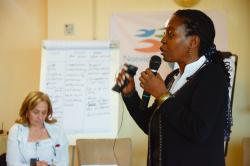Training Women Human Rights Defenders in the South Caucasus
 Nonviolent Peaceforce in the South Caucasus trained women human rights defenders and gender equality advocates working in conflict-affected areas from across the Caucasus and South Asia.
Nonviolent Peaceforce in the South Caucasus trained women human rights defenders and gender equality advocates working in conflict-affected areas from across the Caucasus and South Asia.
The 6-day training of trainers, held in Tiblisi, Georgia in October 2012 was attended by 18 participants from Pakistan, Afganistan, Georgia, Armenia and Azerbaijan.
Participants learned how to effectively and meaningfully engage, influence, and mobilize for dialogues on security and peace issues at various levels nationally and regionally.
NP worked with UN WOMEN to enhance the capacity of women’s human rights activists and gender equality advocates and their networks to effectively and meaningfully engage, influence, and mobilize for dialogues on security and peace issues at various levels nationally and regionally in the South Asia (Pakistan and Afghanistan) as well as the Southern Caucasus (Georgia, Armenia, Azerbaijan).
“I will engage the stakeholders on the ground as soon as I get back,” said one participant from Armenia.
The above quote, from a Government representative, speaks to the need of supporting both civil society and government agencies on learning how to positively engage one-another with a spirit of cooperation and the need to build meaningful partnerships with common goals.
The training was conducted in partnership with UN Women in Georgia, under the EU-funded Programme, “Women Connect Across Conflicts” which aims to build accountability for implementing UN Security Council Resolutions relating to women and conflict.
In this spirit, the training course provided the participants an opportunity to conceptualise sexual and gender based violence issues in relation to their own intervention strategies and reflect on proactive strategies to document, report and monitor human and women rights violations.
“It has been my privilege to be a part of something that instils a sense of empowerment for individuals and communities in specific areas where NP works and in other regions affected by violent conflict,” said Rosemary Kibaki, co-facilitator of the training and an NP Unarmed Civilian Peacekeeper. Rosemary, from Kenya, joined NP some two-and-a-half years ago, spending the initial two years with NP in the Philippines.
The skills imparted during the training will in turn strengthen referral mechanisms for victims of such violence during and after conflicts. NP’s reporting and monitoring techniques were vital in facilitating skills development.
“I will be more proactive in using these skills in monitoring and reporting as a Human Rights Defender in strengthening linkages,” said a participant from Pakistan.
NP’s ten years of accumulated expertise in enabling skills enhancement in civilian protection mechanisms provided an ideal opportunity for these selected human rights defenders from around the region to maximize on their impact on addressing and redressing sexual and gender-based violence.
The above training was in relation to NP’s participation and engagement in the ‘Experts’ meeting on ‘Mainstreaming a Gender Perspective into Security Sector Reform’ held on 18-19 September in Tbilisi. In addition to the presentations and spirited discussions on cross regional initiatives from security sector representatives and experts from NATO, Tajikistan, Georgia, Estonia, and Albania, Members of the Working Group from the Gender Equality Council in Georgia,
As a follow-up to the training, UN WOMEN and NP held a one-day meeting with members of the Working Group of the Gender Equality Council on 26 October. The Working Group members, composed of representative from Parliament, Government and NGO’s, considered and identified support mechanisms for survivors of sexual and gender-based violence.
Hands on experience from NP in Philippines, was enormously appreciated by the Working Group as it enabled them to relate to the practical workings of a National Referral Mechanism – a crucial tool in enabling the early monitoring, reporting and response of human rights violations in conflict and post-conflict scenarios.
‘I really appreciate the work of your organisation (NP) and thank you for your input in Georgia,” said the Gender Equality Council Chair.
